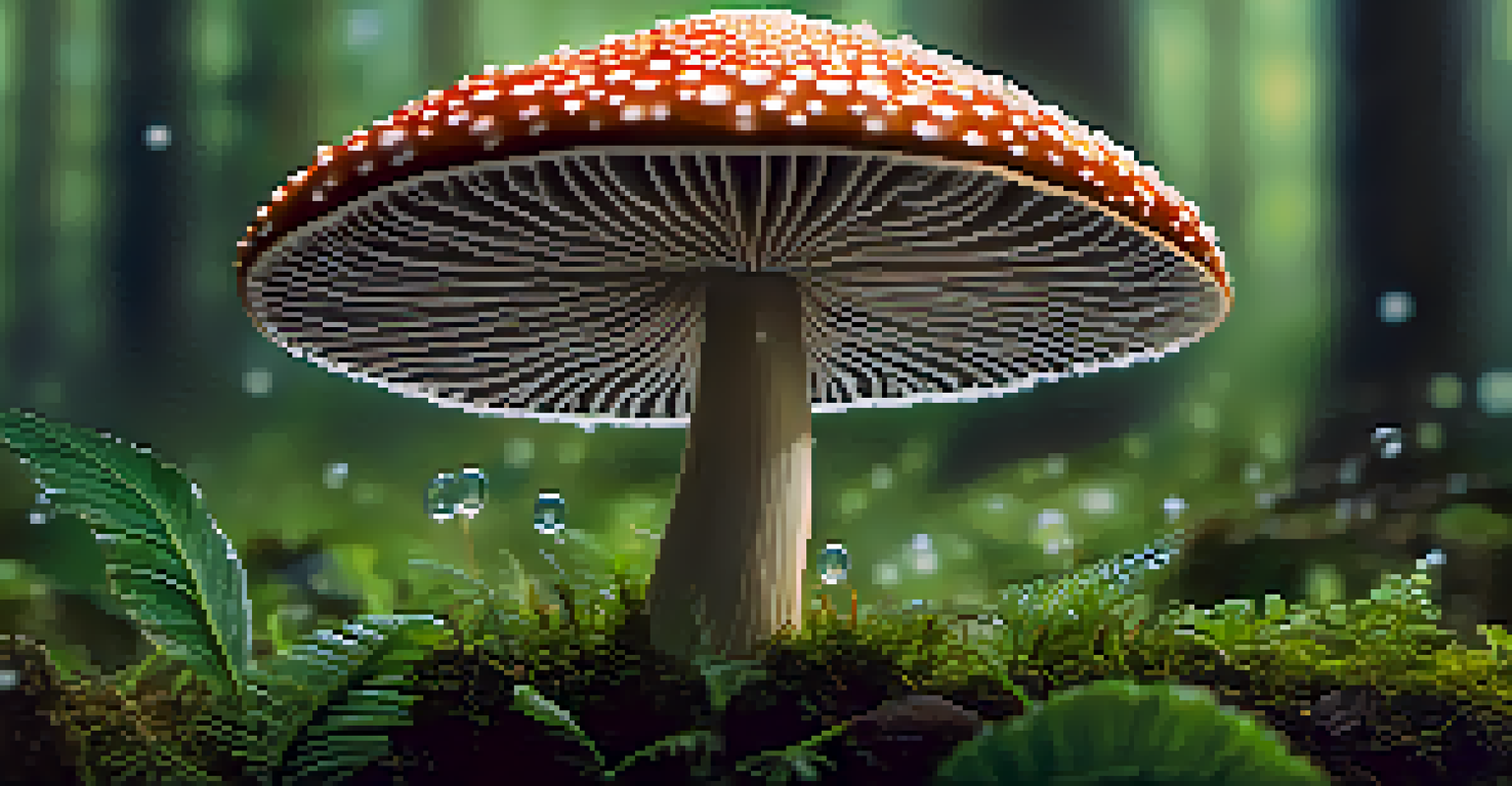Entheogens: A Gateway to Uncovering Your True Self

What Are Entheogens and Their Historical Context?
Entheogens are substances that can induce profound spiritual experiences, often used in rituals and ceremonies throughout history. These natural compounds, like psilocybin mushrooms and ayahuasca, have been utilized by various cultures for centuries to connect with the divine and explore consciousness. Their name, derived from Greek, translates to 'generating the divine within,' which perfectly encapsulates their purpose in many traditions.
Entheogens can lead to profound psychological insights that transform lives, enabling individuals to confront their fears and heal from deep-seated traumas.
In ancient societies, such as those in Mesoamerica, entheogens played a crucial role in religious practices, helping individuals gain insights into their existence and the universe. The rituals surrounding these substances often fostered community bonds and shared experiences, creating a rich tapestry of cultural significance. As interest in spirituality and self-exploration has surged in modern times, entheogens are making a resurgence in both therapeutic and personal contexts.
Understanding the historical background of entheogens provides important context for their potential benefits today. With growing scientific research supporting their therapeutic uses, many are beginning to view these substances through a lens of enlightenment rather than stigma. This shift invites us to explore how they can aid in uncovering our true selves.
The Psychological Impact of Entheogens
Entheogens can profoundly impact our psychological state, often leading to introspective insights and emotional breakthroughs. While under the influence, individuals may confront deep-seated fears, unresolved traumas, or long-held beliefs, providing an opportunity for healing and personal growth. The experience can be likened to peeling back the layers of an onion, revealing the core of who we truly are.

Research indicates that these substances can promote neuroplasticity—the brain's ability to reorganize itself by forming new neural connections. This adaptability opens pathways for new perspectives and ways of thinking, which can be especially beneficial in therapeutic settings. For many, the journey with entheogens is not just about the experience itself but the integration of those insights into their daily lives.
Entheogens Foster Spiritual Growth
Entheogens have been used for centuries in various cultures to connect with the divine and explore consciousness.
The psychological effects can also extend beyond the individual. Many report feeling a deeper connection to others and the world around them, fostering empathy and compassion. This interconnectedness can encourage individuals to reflect on their place in the universe, enhancing their understanding of self in relation to the larger whole.
Navigating the Experience: Preparation and Mindset
Before embarking on an entheogenic journey, preparation and mindset play crucial roles in shaping the experience. Setting intentions can be a powerful way to focus your thoughts and emotions, helping to guide the journey toward self-discovery. Whether it’s seeking clarity on a specific issue or aiming for general insight, having a clear purpose can enhance the experience.
The mind is like a garden; if you do not cultivate it, it will grow weeds. Entheogens can be the tools that help you pull those weeds and plant new seeds of understanding.
Creating a safe and comfortable environment is also essential. Surrounding yourself with supportive individuals and minimizing distractions allows for a more profound exploration of consciousness. Think of it as setting the stage for a performance; the right setting can make all the difference in how the experience unfolds.
Lastly, integrating practices such as meditation or journaling before the experience can help ground your thoughts. This preparation can foster a sense of openness and receptivity, setting the stage for deeper introspection and understanding. Remember, the journey is as much about the preparation as it is about the experience itself.
Integration: Making Sense of the Experience
Integration is the process of incorporating insights gained from an entheogenic experience into your everyday life. After the journey, individuals often find themselves with a wealth of knowledge and perspective that can feel overwhelming. Taking the time to reflect and process these insights ensures they don't fade away but instead become a part of your life’s narrative.
Journaling can be a helpful tool during this phase, allowing you to articulate thoughts and feelings that surfaced during the experience. By writing down your reflections, you create a tangible record of your insights, which can be revisited as you continue your journey of self-discovery. This practice not only solidifies your experiences but can also reveal patterns and themes that may require further exploration.
Therapeutic Benefits of Entheogens
Recent research highlights the potential of entheogens in treating mental health issues like depression and PTSD by facilitating emotional breakthroughs.
Engaging with a supportive community or therapist experienced in entheogen integration can also enhance this process. Sharing your journey with others fosters connection and can provide additional perspectives that enrich your understanding. Integration is not just about reflection; it's about transforming insights into actionable changes in your life.
Common Misconceptions About Entheogens
Despite their growing popularity, numerous misconceptions about entheogens persist, often stemming from cultural stigma and misinformation. One common belief is that these substances are merely recreational, used only for escapism or hedonism. In reality, many people use entheogens for serious self-exploration, healing, and spiritual growth, seeking a deeper connection to themselves and the universe.
Another misconception is the notion of a 'bad trip.' While challenging experiences can occur, they often serve as catalysts for crucial insights and personal growth. Just like climbing a mountain can be arduous but ultimately rewarding, navigating difficult emotions during an entheogenic journey can lead to significant breakthroughs and healing.
Lastly, some believe that entheogens are a shortcut to enlightenment. However, the truth is that personal growth is a continuous journey that requires effort and commitment beyond the experience itself. Entheogens can be powerful tools, but they work best when integrated with ongoing self-reflection and personal development.
The Role of Set and Setting in the Journey
The concept of 'set and setting' refers to the mindset of the individual ('set') and the physical and social environment ('setting') during an entheogenic experience. Both play a crucial role in shaping the journey and the insights gained. A positive mindset and a supportive environment can lead to transformative experiences, while negative factors can result in distress or confusion.
Think of it like hosting a dinner party; the ambiance, food, and company all contribute to the overall experience. Similarly, a calm, safe space with trusted companions can enhance the depth of the journey. Music, lighting, and even the presence of nature can create a nurturing atmosphere that encourages exploration and connection.
Importance of Set and Setting
The mindset and environment significantly influence the entheogenic experience, shaping the insights gained during the journey.
Being mindful of set and setting is essential for optimizing the benefits of entheogens. Preparing a comfortable space, eliminating distractions, and ensuring emotional support can help individuals dive deeper into their self-exploration. Ultimately, creating the right conditions can lead to richer insights and a more profound understanding of oneself.
Entheogens and Their Therapeutic Potential
Recent research has revealed the therapeutic potential of entheogens in treating various mental health conditions, including depression, anxiety, and PTSD. Clinical studies highlight how substances like psilocybin and MDMA can facilitate powerful therapeutic breakthroughs by allowing individuals to confront and process their emotions in a safe environment. This shift in perspective can lead to lasting changes in mental health and well-being.
Therapists often report that entheogens can help break down psychological barriers, enabling patients to access difficult emotions that may have been buried for years. This access can create a unique opportunity for healing, as individuals work through trauma and gain new insights about their lives. It’s akin to shining a light into dark corners, illuminating areas that need attention and understanding.

The integration of entheogens into therapeutic practices is still in its infancy, but the results thus far are promising. As society becomes more open to exploring unconventional methods of healing, the dialogue around entheogens continues to evolve. Their potential as tools for self-discovery and mental health treatment is an exciting frontier in both psychology and spirituality.